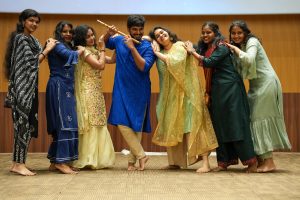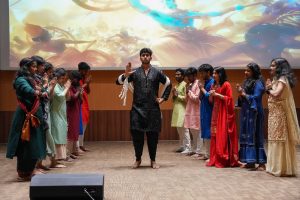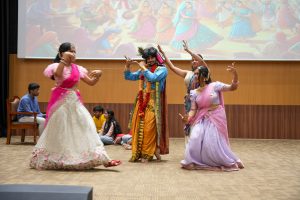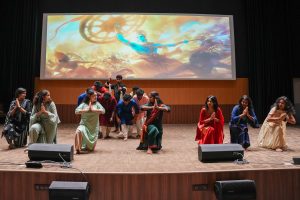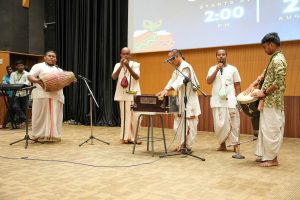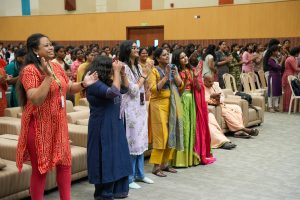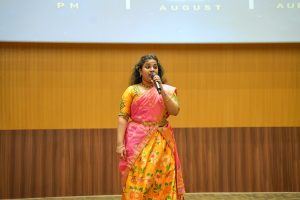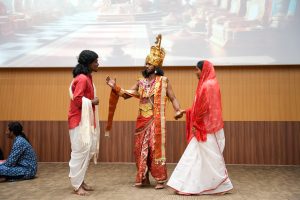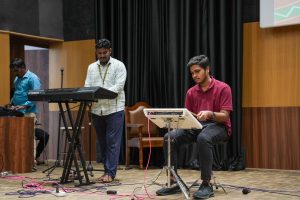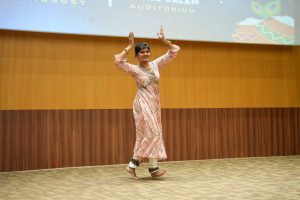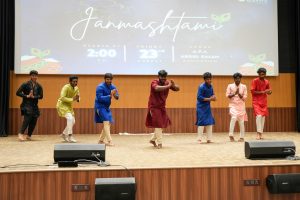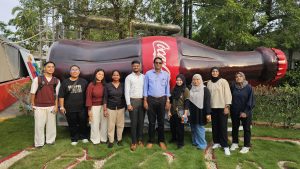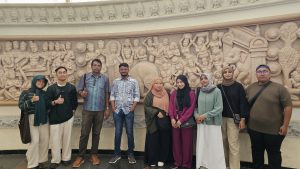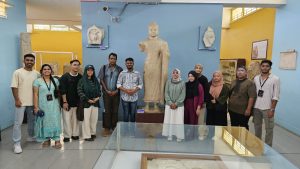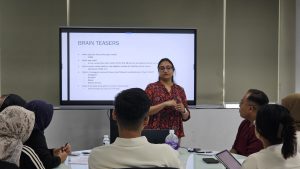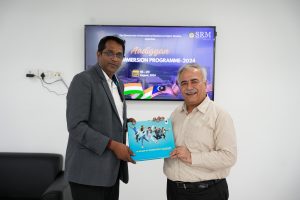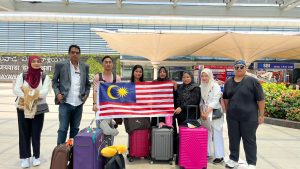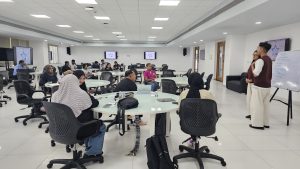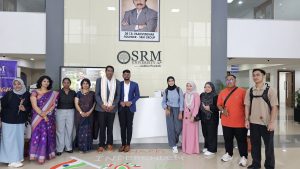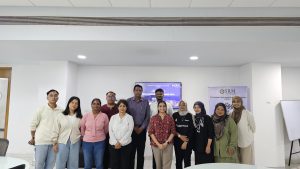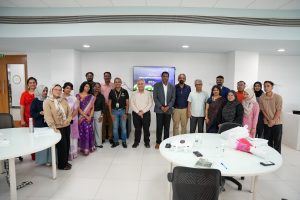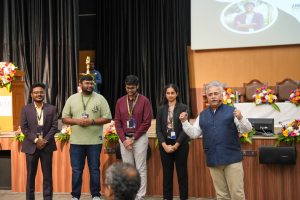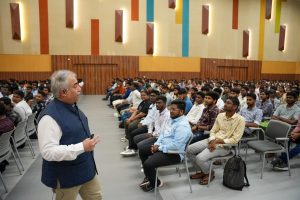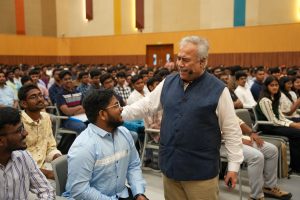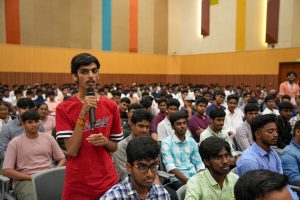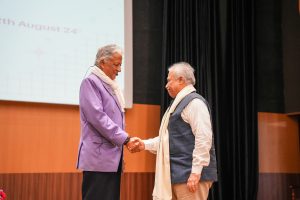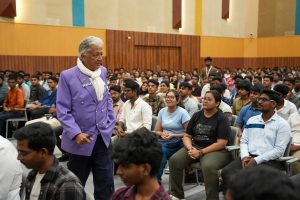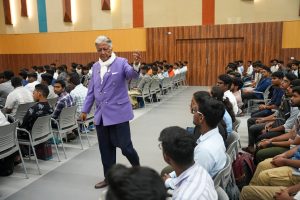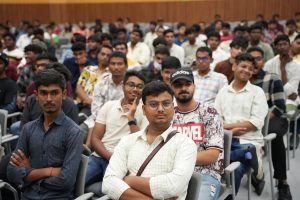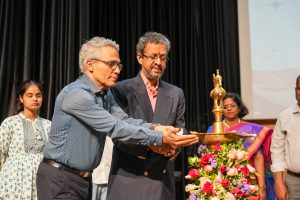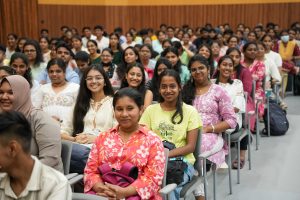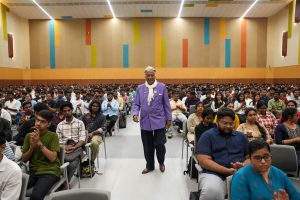SRM-AP All News
ALL News
- SRM University-AP Celebrates Janmashtami with Devotion and Joy August 27, 2024
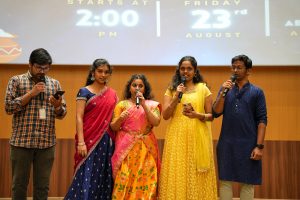 Sweeter than honey, tastier than curd, pleasanter indeed than any happiness, and joy is the company, is the power of the name of Krishna. Janmashtami is celebrated as the birthday of Lord Krishna, one of the most powerful and famous reincarnations of Lord Vishnu.
Sweeter than honey, tastier than curd, pleasanter indeed than any happiness, and joy is the company, is the power of the name of Krishna. Janmashtami is celebrated as the birthday of Lord Krishna, one of the most powerful and famous reincarnations of Lord Vishnu.To seek the blessings of Lord Krishna, the Directorate of Student Affairs at SRM University-AP celebrated Janmashtami on August 23, 2024, with mirth and joy. The campus was filled with the fragrance of flowers, the soothing aroma of camphor, and the jingle of bells, creating a divine atmosphere.
While the religious significance of Janmashtami was deeply honoured, the day also symbolised much more for modern India. It was a day of excitement, euphoria, and a joyous spirit of enthrallment. The celebration brought together devotion, creativity, enjoyment, and fun.
Additionally, the event featured a captivating story recital narrating Lord Krishna’s divine leelas, which enchanted the audience. Devotional singing by the devotees of ISKCON further elevated the spiritual ambience, making the celebration truly memorable. The Janmashtami celebration wasn’t just a series of events; it was a testament to the power of unity, tradition, and the true spirit of Janmashtami. The Auditorium was alive with laughter and enthusiasm during the fun activities, complemented by the elegant area adorned for Krishna Pujan, creating a serene backdrop for our spiritual observance.
This event beautifully showcased the ability of communal celebrations to bring our community together, fostering an appreciation for the significance of Lord Krishna’s birth in a joyous and meaningful manner. As we reflect on the joy and unity of Janmashtami 2024, our hope is that the blessings of Lord Krishna continue to guide and inspire our community throughout the year.
Continue reading → - Naga Sravanthi Explores the Role of Blockchain in Food Marketing August 23, 2024
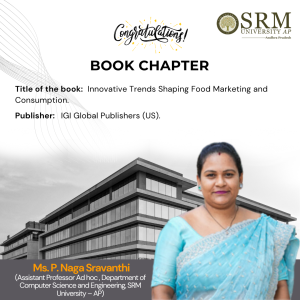 In a significant contribution to the field of food marketing and consumption, Ms P Naga Sravanthi, an Assistant Professor Ad hoc in the Department of Computer Science and Engineering, has recently published a book chapter titled “Blockchain-Based Food Influencer Verification.” The chapter is part of the book “Innovative Trends Shaping Food Marketing and Consumption,” shedding light on the emerging use of blockchain technology in authenticating food influencers.
In a significant contribution to the field of food marketing and consumption, Ms P Naga Sravanthi, an Assistant Professor Ad hoc in the Department of Computer Science and Engineering, has recently published a book chapter titled “Blockchain-Based Food Influencer Verification.” The chapter is part of the book “Innovative Trends Shaping Food Marketing and Consumption,” shedding light on the emerging use of blockchain technology in authenticating food influencers.In the rapidly evolving world of food marketing, trust and authenticity have become more critical than ever. The book chapter delves into how blockchain technology can revolutionise the way food influencers are verified and trusted by their audiences. Blockchain technology, known for its transparency and security features, has been making waves across various industries, and its application in the food sector is no exception.
Ms Naga Sravanthi’s work focuses on utilising blockchain to verify the credibility and authenticity of food influencers, a vital aspect in today’s digital era, where influencer marketing plays a significant role in consumer decision-making. The book chapter explores how blockchain can address issues of trust and reliability in food marketing by providing a secure and immutable record of influencers’ endorsements and partnerships. This innovative approach not only benefits consumers by ensuring they receive genuine recommendations but also helps food brands collaborate with legitimate and reputable influencers.
The publication of this book chapter underscores SRM University-AP’s commitment to fostering cutting-edge research and innovation in diverse fields, positioning its faculty members as thought leaders in their respective domains. Ms Naga Sravanthi’s work serves as a testament to the university’s dedication to academic excellence and pushing the boundaries of knowledge in emerging technologies.
Brief Description of the Book Chapter:
This chapter explores the integration of blockchain technology into the verification process of food influencers, providing a transparent and tamper-proof method to authenticate their influence and endorsements. By leveraging blockchain, the chapter outlines how the food industry can ensure that influencers are genuine, their endorsements are credible, and their impact is accurately measured. The chapter also delves into case studies and practical applications, demonstrating how this technology can reshape the landscape of influencer marketing in the food sector.Significance of the Book Chapter
The significance of this chapter lies in its exploration of a cutting-edge application of blockchain technology in a field that deeply influences consumer behaviour in food marketing. As the digital space becomes more saturated with influencers, the need for a reliable verification system becomes paramount. This chapter is particularly meaningful because it addresses the growing concern of authenticity in influencer marketing, a crucial factor in maintaining consumer trust and brand integrity. For those passionate about the intersection of technology, marketing, and food, this chapter offers insights into how blockchain can be a game-changer in ensuring that the voices consumers trust is, indeed, trustworthy.Target Audience
The book is primarily targeted at professionals in the food industry, including marketers, brand managers, and digital strategists, who are keen on understanding the latest trends shaping consumer behaviour and marketing practices. Additionally, this chapter will be valuable to academics and students in the fields of marketing, food science, and technology, as well as tech enthusiasts interested in the practical applications of blockchain.
Startups and entrepreneurs looking to innovate within the food sector will also find this book to be a vital resource, providing both theoretical insights and practical examples of how technology can redefine industry standards.In essence, “Innovative Trends Shaping Food Marketing and Consumption” and its chapter on blockchain-based influencer verification is an essential read for anyone looking to stay ahead of the curve in the dynamic world of food marketing.
Continue reading → - SRM University-AP Hosts Transformative Aadigyan 2024 for Malaysian Students August 22, 2024
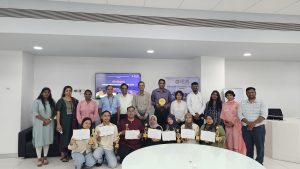 The Directorate of International Relations &Higher Studies recently concluded the Aadigyan—Indian Immersion Program 2024, a comprehensive five-day event held from August 16th to 20th. This program was designed to provide bachelor students from UTP Malaysia with an immersive experience of Indian culture, economy, and technological advancements.
The Directorate of International Relations &Higher Studies recently concluded the Aadigyan—Indian Immersion Program 2024, a comprehensive five-day event held from August 16th to 20th. This program was designed to provide bachelor students from UTP Malaysia with an immersive experience of Indian culture, economy, and technological advancements.The program offered a rich blend of academic lectures, hands-on workshops, industry visits, cultural experiences, and recreational activities. Over the course of five days, students engaged in cultural exchange and understanding through interactive sessions and cultural tours, fostering a deeper connection between Indian and Malaysian students.
Participants were introduced to various facets of Indian history, economy, business models, and technological advancements, broadening their intellectual horizons. Industry visits provided insights into the Indian industrial landscape, promoting an understanding of emerging trends and opportunities.
Highlights of Aadigyan IIP 2024:
- Design Thinking Workshop: Conducted by Prof. Satyanarayana Duvvuri, Associate Director – Directorate of Executive Education and Professional Studies & Professor of Practice, Paari School of Business.
- Essence of Entrepreneurship: A session by Prof. Sidharth Tripathy, Director of Entrepreneurship and Innovation, highlighting the importance of creating new products and ideas to meet market needs. Prof. Tripathy explained that entrepreneurship is derived from the Sanskrit words “antah” (innermost) and “prerna” (inspiration).
- Climate Change Solutions: Students were tasked with providing solutions for contemporary climate change issues, enhancing their understanding of the scope and impact of these problems.
- Customer-Centric Product Development: Emphasized the need for a deep understanding of customers, empathy, and creative problem-solving. Students learned the importance of observing market dynamics to connect with customers effectively.
- Business Insights: AVS Kamesh from PSB provided an introduction to key elements of business and career paths in marketing and management.
- Digital Marketing: Kirti Krishna conducted a session on digital marketing tools and the differences between traditional and digital marketing.
The program concluded with a valedictory address by Sandeep Samala. During the ceremony, students and professors from the IR council shared heartfelt experiences, reflecting on their journey together. The event was marked by the exchange of mementos and the capturing of photographs, commemorating this significant event in their academic careers. Aadigyan IIP 2024 aimed to inspire, educate, and empower the next generation of leaders from Malaysia, preparing them to tackle the challenges and opportunities of the 21st-century global landscape.
The “Aadigyan – Indian Immersion Program 2024” at SRM University-AP stands as a testament to the institution’s commitment to fostering global understanding and preparing future leaders for success in the interconnected world.
Continue reading → - Dr Vineeth Thomas Analyses Challenges Ahead for Modi’s Third Term August 22, 2024
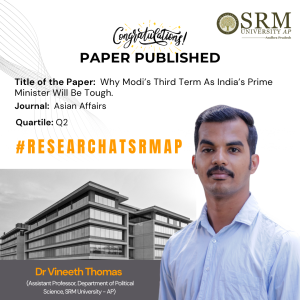 Dr Vineeth Thomas, an Assistant Professor in the Department of Political Science, has recently published a thought-provoking paper titled “Why Modi’s Third Term as India’s Prime Minister Will Be Tough” in the distinguished journal Asian Affairs. In his comprehensive analysis, Dr Vineeth delves into the political landscape of India and the various challenges Prime Minister Narendra Modi may face if he seeks re-election for a third consecutive term in 2024. Drawing on an array of political theories and current socio-economic indicators, the paper examines the underlying factors shaping Indian politics and public sentiment.
Dr Vineeth Thomas, an Assistant Professor in the Department of Political Science, has recently published a thought-provoking paper titled “Why Modi’s Third Term as India’s Prime Minister Will Be Tough” in the distinguished journal Asian Affairs. In his comprehensive analysis, Dr Vineeth delves into the political landscape of India and the various challenges Prime Minister Narendra Modi may face if he seeks re-election for a third consecutive term in 2024. Drawing on an array of political theories and current socio-economic indicators, the paper examines the underlying factors shaping Indian politics and public sentiment.Dr Thomas argues that while Modi’s leadership has been marked by significant economic reforms and a robust foreign policy, the landscape is shifting in a manner that could complicate his re-election bid. Key issues explored in the paper include rising economic disparities, increasing urban unrest, and the challenge of maintaining communal harmony in a diversely populated nation.
The findings of this research are particularly pertinent in light of ongoing debates surrounding economic policy, agrarian distress, and the role of civil liberties – a backdrop that could significantly influence electoral dynamics heading into 2024.
The publication of this paper not only highlights Dr Thomas’s expertise in political science but also underscores the vital role academic discourse plays in contemporary political analysis. His insights contribute to a deeper understanding of India’s complex interplay between governance and public perception.
Abstract of the Research
On 9 June 2024, Narendra Modi became India’s Prime Minister for a third consecutive term, a feat previously accomplished only by Jawaharlal Nehru. However, this historic victory also began one of the most uncertain periods of his prime ministership. The fractured outcome of India’s 18th general election has created a fundamentally different political landscape. Modi’s Bharatiya Janata Party (BJP) secured just 240 seats, a significant drop from its 2019 tally, and was therefore short of an absolute majority. Although the BJP-led National Democratic Alliance (NDA) did win a majority, Modi will now be dependent upon coalition partners, necessitating a shift towards a more collaborative governance style.
Research in Layperson’s Terms
In the recent election, Modi’s party, the BJP, won only 240 seats, much fewer than in the last election and not enough for a clear majority. Although the broader alliance led by the BJP still has a majority, Modi now needs to rely more on other parties in the alliance to govern. This means he will have to work more closely with his coalition partners and be more collaborative in his leadership style.
Research Paper in the Citation Format
Vineeth Thomas, Agney GK & Arsha V Sathyan (2024), Why Modi’s Third Term As India’s Prime Minister Will Be Tough, Asian Affairs, ISSN: 0306-8374
(Routledge, SCOPUS/WoS Indexed)Practical implementation or the social implications associated with Research
The practical implementation of my research lies in shaping policies that promote gender equality in political representation. By identifying barriers and proposing solutions, it aims to enhance women’s participation in politics, leading to more inclusive governance. The social implications include fostering a more equitable society with diverse perspectives in decision-making.
Your collaborations
Electoral Politics
Your Future Research Plans
Indian govt and politics
Continue reading → - SRM AP Partners with ISF as Regional Hub for Rural Ankura Yatra Semi-Finals August 22, 2024
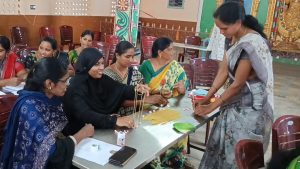 In a pioneering move to promote innovation and entrepreneurship at the grassroots level, SRM University-AP is proud to announce its partnership with the International Startup Foundation (ISF) as the regional hub for conducting the semi-finals of the Rural Ankura Yatra. This ambitious initiative by ISF seeks to ignite the entrepreneurial spirit across tier 2 and 3 cities and rural areas, identifying and nurturing latent entrepreneurial talent.
In a pioneering move to promote innovation and entrepreneurship at the grassroots level, SRM University-AP is proud to announce its partnership with the International Startup Foundation (ISF) as the regional hub for conducting the semi-finals of the Rural Ankura Yatra. This ambitious initiative by ISF seeks to ignite the entrepreneurial spirit across tier 2 and 3 cities and rural areas, identifying and nurturing latent entrepreneurial talent.
The Rural Ankura Bus Yatra, spearheaded by ISF, is more than just a journey—it’s a celebration of the entrepreneurial potential nestled within the heart of rural Andhra Pradesh. By uniting global CXOs, mentors, investors, researchers, and educators, this statewide yatra aims to strengthen the rural startup ecosystem, ultimately catalysing job creation and fostering economic growth in underserved regions.The startup pitch contest, a key component of the Yatra, will serve as a platform for rural innovators to showcase their ideas and solutions to local problems. This initiative aligns seamlessly with SRM University-AP’s mission to drive innovation and entrepreneurship across the country.
Vice-Chancellor of SRM University-AP, Prof. Manoj K Arora, expressed his enthusiasm for the partnership, stating, “At SRM University-AP, we are deeply committed to fostering a culture of innovation and entrepreneurship. Partnering with ISF for the Rural Ankura Yatra allows us to extend our mission beyond urban centres, empowering rural innovators to drive meaningful change within their communities.”The regional semi-finals at SRM University-AP are scheduled for September 11, 2024. The event is expected to draw over 500 participants from various districts, with the top 20 teams—10 from each category—advancing to the final demo day. These teams will have the opportunity to exhibit their ideas and solutions at SRM University-AP, vying for the support and investment needed to bring their ventures to life.
A distinguished panel of high-profile delegates, including professors from SRM University-AP and leaders from ISF, will serve as the jury, selecting the most promising ventures for the finals. Notably, five offers from venture capitalists associated with ISF will be extended to the top ventures.
Dr Siddharth Shankar Tripathi, Director of Entrepreneurship and Innovation at SRM University-AP, added, “The Rural Ankura Yatra is a remarkable initiative that aligns with our vision of holistic development. By nurturing entrepreneurial talent in rural areas, we are not only fueling economic growth but also promoting sustainable development.”
Mr J.A. Chowdary, Founding Director of Software Technology Parks of India and former IT Advisor and Special Chief Secretary to the Chief Minister of AP, emphasised the importance of the Yatra, stating, “The Rural Ankura Yatra is a vital step towards unlocking the vast potential of rural India. By bringing together global expertise and local talent, we aim to create a thriving ecosystem that supports innovation and entrepreneurship at the grassroots level.”
SRM University-AP has consistently championed entrepreneurship as an economic growth and social change catalyst. One of the university’s flagship initiatives, ADITRI, stands as a testament to this commitment. As a pioneering CSR project, ADITRI is dedicated to supporting and empowering rural women entrepreneurs in Andhra Pradesh. With funding of ₹2 crores, the project aligns with the university’s mission to promote innovation and social responsibility, focusing on economic empowerment, job creation, gender equality, and community development.
Through initiatives such as Micro Entrepreneurship Bootcamps and the Rural Women Innovation and Entrepreneurship Hub (RWIEH), SRM University-AP continues to make a significant impact, having already reached over 1400 women across various mandals in Andhra Pradesh. As the university steps into the role of a regional hub for the Rural Ankura Yatra, it reaffirms its commitment to nurturing the next generation of entrepreneurs who will drive India’s socio-economic transformation.
Continue reading → - A Pathway to Sustainable Active Food Packaging August 20, 2024
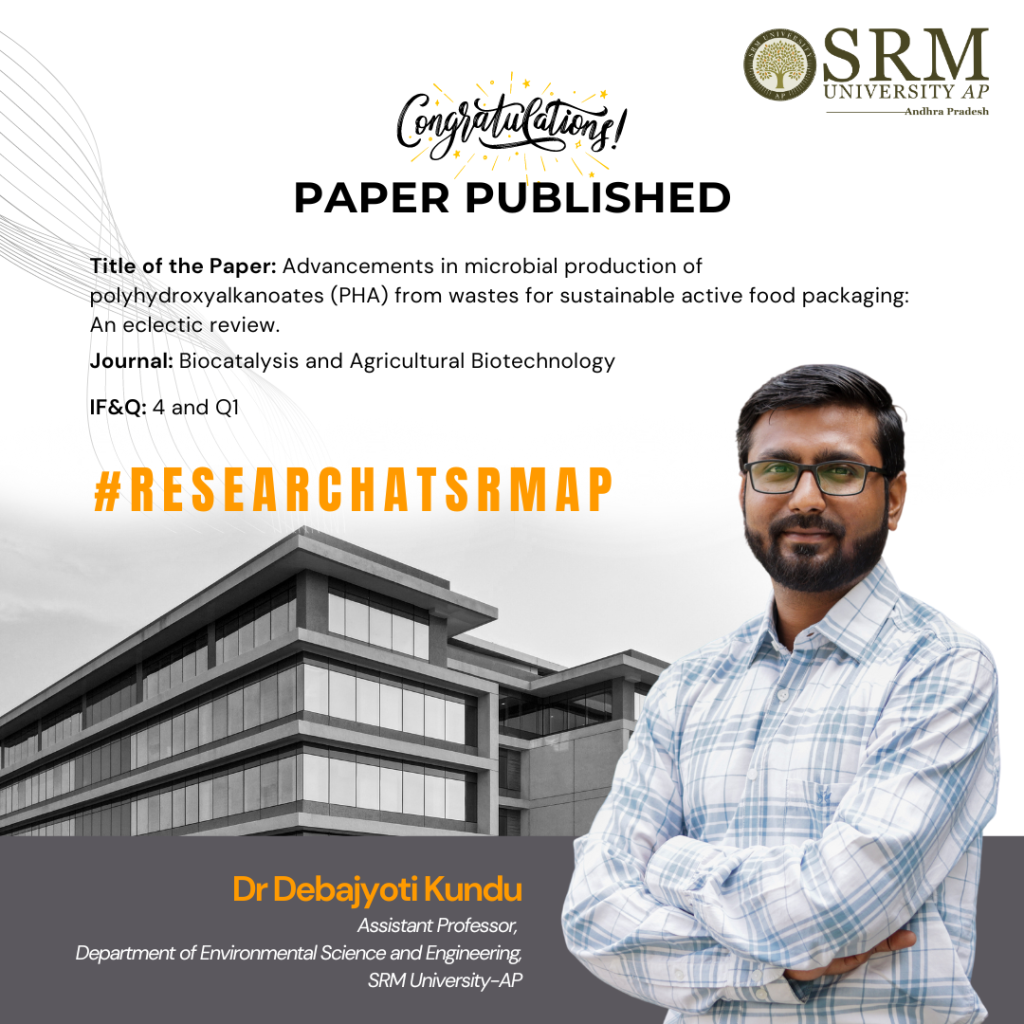
Dr Debajyoti Kundu, Assistant Professor, Department of Environmental Science and Engineering, has conducted an impactful study on developing polyhydroxyalkanoates (PHA), an eco-friendly solution that can help reduce plastic waste and make food packaging more sustainable. His recent paper “Advancements in microbial production of polyhydroxyalkanoates (PHA) from wastes for sustainable active food packaging: An eclectic review”, published in the Q1 journal Biocatalysis and Agricultural Biotechnology, Dr Debajyoti investigates how microorganisms can convert waste into a special type of plastic called PHA, which can be used for food packaging.
Unlike regular plastics, PHA is biodegradable and safe for both the environment and human health. The study reviews recent innovations in making PHA stronger and more effective for packaging, including its ability to prevent food spoilage and improve food safety.
Abstract
This study explores advancements in microbial production of polyhydroxyalkanoates (PHA) from waste resources for sustainable active food packaging. It highlights the eco-friendly nature of PHAs as bioplastics and their potential to replace synthetic plastics in food packaging. The paper discusses recent technological improvements in PHA production and formulations, focusing on enhancing material properties to make PHA a viable alternative. It also examines trends in active packaging, including antimicrobial, antioxidant properties, and spoilage indicators, which can significantly improve food safety and quality.
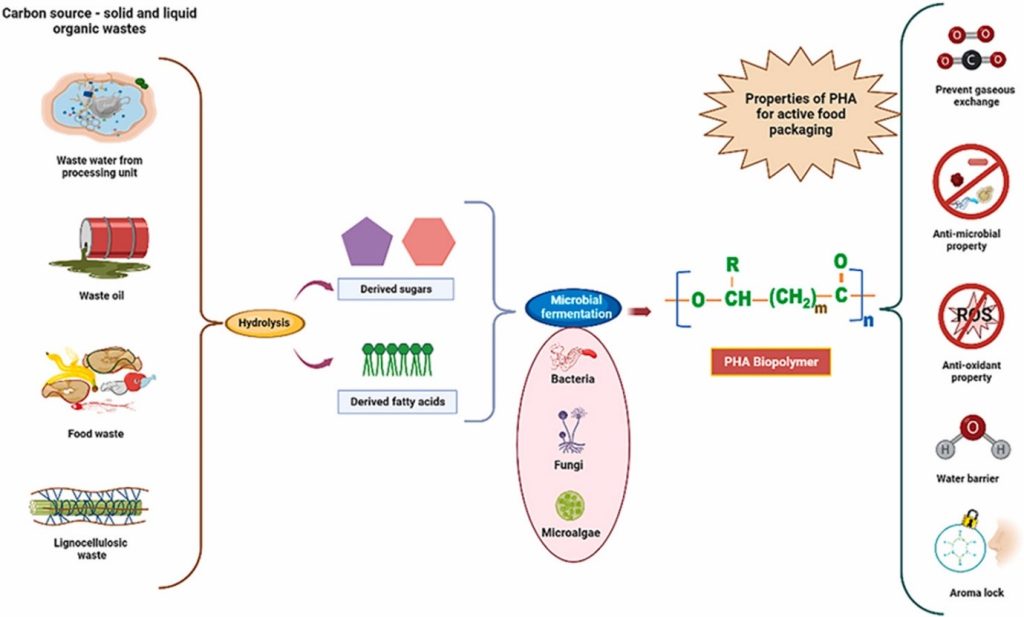
Practical Implementation/ Social Implications of the Research
The practical implementation of this research involves using PHA-based materials for food packaging to replace conventional plastics. This can lead to reduced environmental pollution due to PHA’s biodegradability and lower reliance on fossil fuels. Social implications include improved food safety through active packaging features like antimicrobial and antioxidant properties, potentially reducing foodborne illnesses and extending shelf life. Additionally, using waste to produce PHA promotes waste recycling and resource efficiency.
Collaborations
This research is a collaborative effort among various prestigious institutions including St. Joseph’s University, SRM Institute of Science and Technology, Gurudas College, and SRM University-AP.
Moving forward, Dr Debajyoti will continue to work on improving the production processes and formulations of PHA to enhance its mechanical properties and cost-effectiveness. Additionally, he will explore new waste sources for PHA production and develop advanced active packaging technologies, such as smart packaging with sensors for real-time monitoring of food quality. Collaborations with industry partners to scale up production and test real-world applications of PHA-based packaging are another key focus.
Continue reading → - New Chapter Begins: Over 3000 Students Start Their Journey at SRM AP August 13, 2024
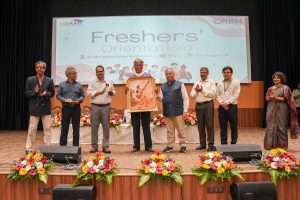 SRM University-AP extends a warm welcome to its newest cohort of students as it kicks off the much-anticipated “UDAAN 2024” orientation programme. This 10-day event, running from August 12 to August 23, is meticulously crafted to seamlessly integrate more than 3000 freshers from more than 20 states of India into the vibrant campus life and academic environment.
SRM University-AP extends a warm welcome to its newest cohort of students as it kicks off the much-anticipated “UDAAN 2024” orientation programme. This 10-day event, running from August 12 to August 23, is meticulously crafted to seamlessly integrate more than 3000 freshers from more than 20 states of India into the vibrant campus life and academic environment.The event began with the traditional lighting of the lamp and an invocation ceremony, setting a tone of reverence and inspiration. During the inaugural session, students were given an overview of the university’s various directorates, schools, and the academic ecosystem, providing them with essential knowledge about their new environment. Deans and directors from all departments were present, underscoring the importance of this milestone in the student’s academic journey.
Pro-Chancellor, SRM University-AP Dr P Sathyanarayanan, extended his warmest wishes to the students, stating “At SRM AP, we are dedicated to shaping the next generation of leaders, innovators, and change-makers. With UDAAN 2024, we are excited to empower our students as they embark on this transformative educational journey. It is our hope that this experience inspires each of you to achieve excellence and make a meaningful impact on the world. Welcome to a vibrant community where your future truly begins.”
Vice Chancellor, SRM University-AP, Prof. Manoj K Arora, addressed the new students, encouraging them to embrace self-reliance and to make the most of every opportunity during their time at the university. He motivated the students and said that they have an opportunity to learn new things, acquire new knowledge, grow new competencies, develop new skills and enhance their personal attributes in profound ways that will shape their character for the rest of their lives. Prof. Arora further added that the students have an opportunity to weave new friendships that will impact their lives in incredible ways and that education is not only about acquiring knowledge and skills, but it also prepares us for life.
The programme was honoured by the presence of Indian Ambassador Deepak Vohra ji, Special Advisor to Prime Minister in Africa and Ladakh, who was the chief guest for the event. His address to the students motivated them on how to attain great heights in their careers even in adverse situations through relentless goal setting, hard work, dedication and determination. He further told the students that if we are divided, we can go fast, but if we are united, we can go far. Deepak Vohra concluded his speech with this line, “The future of India is the future of the world. The whole world trusts India because we are intrinsically good people. You are the hope for the future of a safe and secure world.”
Throughout this 10-day programme, students will participate in a series of sessions designed to familiarise them with the university’s offerings. These include introductions to the academic departments, faculty, and administrative staff, as well as insights into the various clubs and associations that contribute to a holistic educational experience at SRM University-AP.
Continue reading → - Algae Biochar: A Promising Solution to Water Pollution August 9, 2024
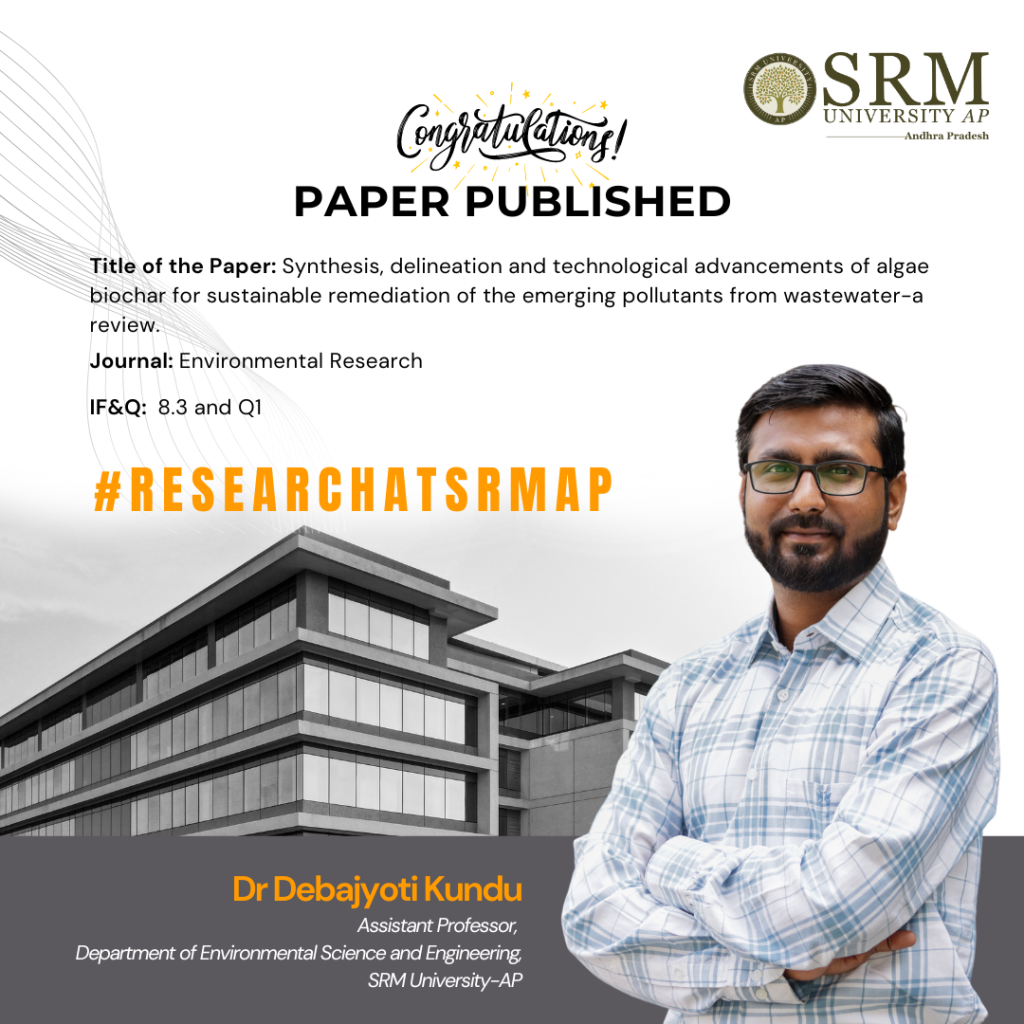
Dr Debajyoti Kundu, Assistant Professor in the Department of Environmental Science and Engineering, has published a research paper titled “Synthesis, delineation and technological advancements of algae biochar for sustainable remediation of the emerging pollutants from wastewater – A Review” in the esteemed Q1 journal “Environmental Research”, which has an impact factor of 8.3.
Dr Debajyoti’s research focuses on using algae biochar, which is particularly effective at cleaning polluted water. The study reviews how this biochar is made and improved and how it can effectively remove harmful substances from wastewater. This process is sustainable and environmentally friendly, offering a promising solution to water pollution.
Abstract
The study examines the synthesis, technological advancements, and applications of algae biochar for the sustainable remediation of emerging pollutants from wastewater. It highlights the unique properties of algae biochar, including its high surface area, pore volume, and adsorption capacity, which make it an effective medium for removing inorganic and organic contaminants from wastewater. The paper discusses various methods for producing algae biochar, such as pyrolysis, gasification, and torrefaction, and explores chemical and structural modifications to enhance its pollutant removal efficiency.
Practical Implementation /Social Implications of the Research
The practical implementation of this research involves using algae-derived biochar in wastewater treatment plants to remove harmful pollutants. This can lead to cleaner water, reduced environmental pollution, and improved public health. The process is also sustainable and cost-effective, contributing to environmental conservation and resource efficiency.
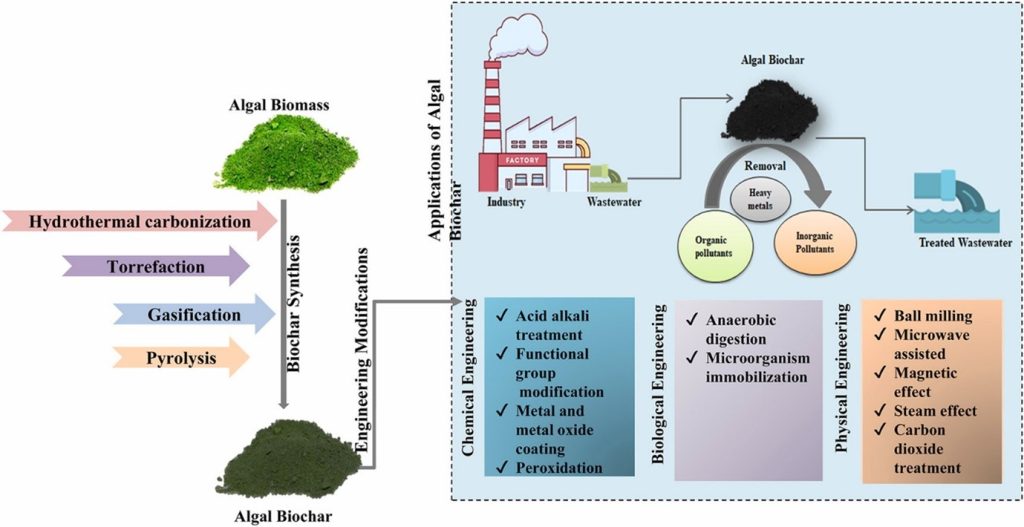
Collaborations
This research is a collaborative effort among various experts from institutions such as the University of Calcutta, Babasaheb Bhimrao Ambedkar University, Koneru Lakshmaiah Education Foundation, Graphic Era Deemed to be University, Indian Institute of Technology Kharagpur, Ranchi University, King Abdulaziz University, Incheon National University, Korea Aerospace University, and B.S. Abdur Rahman Crescent Institute of Science and Technology.
Future Research Plans
Dr Debajyoti’s future research projects include exploring advanced modification techniques for algae biochar to further enhance its pollutant removal capabilities, investigating its application in different types of wastewater, and developing large-scale production methods. Additionally, there is an interest in studying the long-term environmental impacts and economic viability of using algae biochar in wastewater treatment.
Continue reading → - AI-Based Remote Fetal Heart Rate Monitoring Published in Leading Journal August 9, 2024
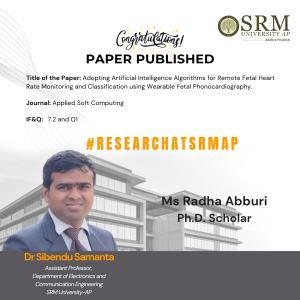 Dr Sibendu Samanta, Assistant Professor in the Department of Electronics and Communication Engineering, and Ms Radha Abburi, a PhD Scholar, have made significant strides in the field of fetal health monitoring. Their paper, titled “Adopting Artificial Intelligence Algorithms for Remote Fetal Heart Rate Monitoring and Classification using Wearable Fetal Phonocardiography,” has been published in the prestigious Q1 Journal, Applied Soft Computing, which boasts an impressive impact factor of 7.2.
Dr Sibendu Samanta, Assistant Professor in the Department of Electronics and Communication Engineering, and Ms Radha Abburi, a PhD Scholar, have made significant strides in the field of fetal health monitoring. Their paper, titled “Adopting Artificial Intelligence Algorithms for Remote Fetal Heart Rate Monitoring and Classification using Wearable Fetal Phonocardiography,” has been published in the prestigious Q1 Journal, Applied Soft Computing, which boasts an impressive impact factor of 7.2.This pioneering study addresses the critical gaps in the analysis of Fetal Heart Rate (FHR) recordings by leveraging wearable Phonocardiography (PCG) signals and advanced AI algorithms. The primary goal of the research is to achieve accurate classification results through the remote monitoring of fetal heartbeats. Additionally, the study tackles complex issues related to data quantity and the inherent complexity of FHR analysis. Dr Samanta and Ms Abburi’s work represents a significant advancement in the field, promising to enhance the accuracy and reliability of fetal health monitoring, ultimately contributing to better prenatal care.
Abstract of the Research:
Fetal phonocardiography (FPCG) is a non-invasive Fetal Heart Rate (FHR) monitoring technique that can detect vibrations and murmurs in heart sounds. However, acquiring fetal heart sounds from a wearable FPCG device is challenging due to noise and artefacts. This research contributes a resilient solution to overcome the conventional issues by adopting Artificial Intelligence (AI) with FPCG for automated FHR monitoring in an end-to-end manner, named (AI-FHR). Four sequential methodologies were used to ensure reliable and accurate FHR monitoring. The proposed method removes low-frequency noises and high-frequency noises by using Chebyshev II high-pass filters and Enhanced Complete Ensemble Empirical Mode Decomposition with Adaptive Noise (ECEEMDAN) in combination with Phase Shifted Maximal Overlap Discrete Wavelet Transform (PS-MODWT) filters, respectively.
The denoised signals are segmented to reduce complexity, and the segmentation is performed using multi-agent deep Q-learning (MA-DQL). The segmented signal is provided to reduce the redundancies in cardiac cycles using the Artificial Hummingbird Optimization (AHBO) algorithm. The segmented and non-redundant signals are converted into 3D spectrograms using a machine learning algorithm called variational auto-encoder-general adversarial networks (VAE-GAN). The feature extraction and classification are carried out by adopting a hybrid of the bidirectional gated recurrent unit (BiGRU) and the multi-boosted capsule network (MBCapsNet). The proposed method was implemented and simulated using MATLAB R2020a and validated by adopting effective validation metrics.
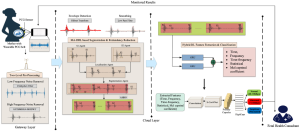
The results demonstrate that the proposed method performed better than the current method with accuracy (81.34%), sensitivity (72%), F1-score (83%), Energy (0.808 J), and complexity index (13.34). Like other optimization methods, AHO needs precise parameter adjustment in order to function well. Its performance may be greatly impacted by the selection of parameters, including population size, exploration rate, and learning rate.
The title of the Research Paper in the Citation Format:
R. Abburi, I. Hatai, R. Jaros, R. Martinek, T. A. Babu, S. A. Babu, S. Samanta, “Adopting artificial intelligence algorithms for remote fetal heart rate monitoring and classification using wearable fetal phonocardiography”, Applied Soft Computing, vol. 165, pp. 112049, 2024, ISSN 1568-4946.Practical Implementation or the Social Implications Associated with the Research
- Chebyshev filter and EC2EMDAN-PS-MODWT reduce low and high frequency noises.
- MA-DRL and optimization algorithms reduce complexity during classification.
- Machine learning spectrogram conversion to capture time, frequency, and spectral variations.
- Hybrid deep learning algorithms can be used to reduce positive rates.
Collaborations:
- Dr. Indranil Hatai (Signal Processing and FPGA, Mathworks, Bangalore, India)
- Dr. T. Arun Babu (HoD, Dept. of Pediatrics, All India Institute of Medical Sciences (AIIMS), Andhra Pradesh, India)
- Dr. Sharmila Arun Babu, MBBS, MS (HoD, Dept. of Obstetrics and Gynecology, All India Institute of Medical Sciences (AIIMS), Andhra Pradesh, India)
- Dr. Rene Jaros (Dept. of Cybernetics and Biomedical Engineering, Faculty of Electrical Engineering and Computer Science, VSB–Technical University of Ostrava, 708 00, Ostrava, Czechia)
- Prof. Radek Martinek (Dept. of Cybernetics and Biomedical Engineering, Faculty of Electrical Engineering and Computer Science, VSB–Technical University of Ostrava, 708 00, Ostrava, Czechia)
Future Research Plans:
- Design a low cost for continuous fetal heart rate (FHR) monitoring system
- Develop a proper deep learning algorithm to get a proper understanding of fetal’s abnormality.
- Scaling Heights: Nilesh Bags an Internship at RBI August 9, 2024
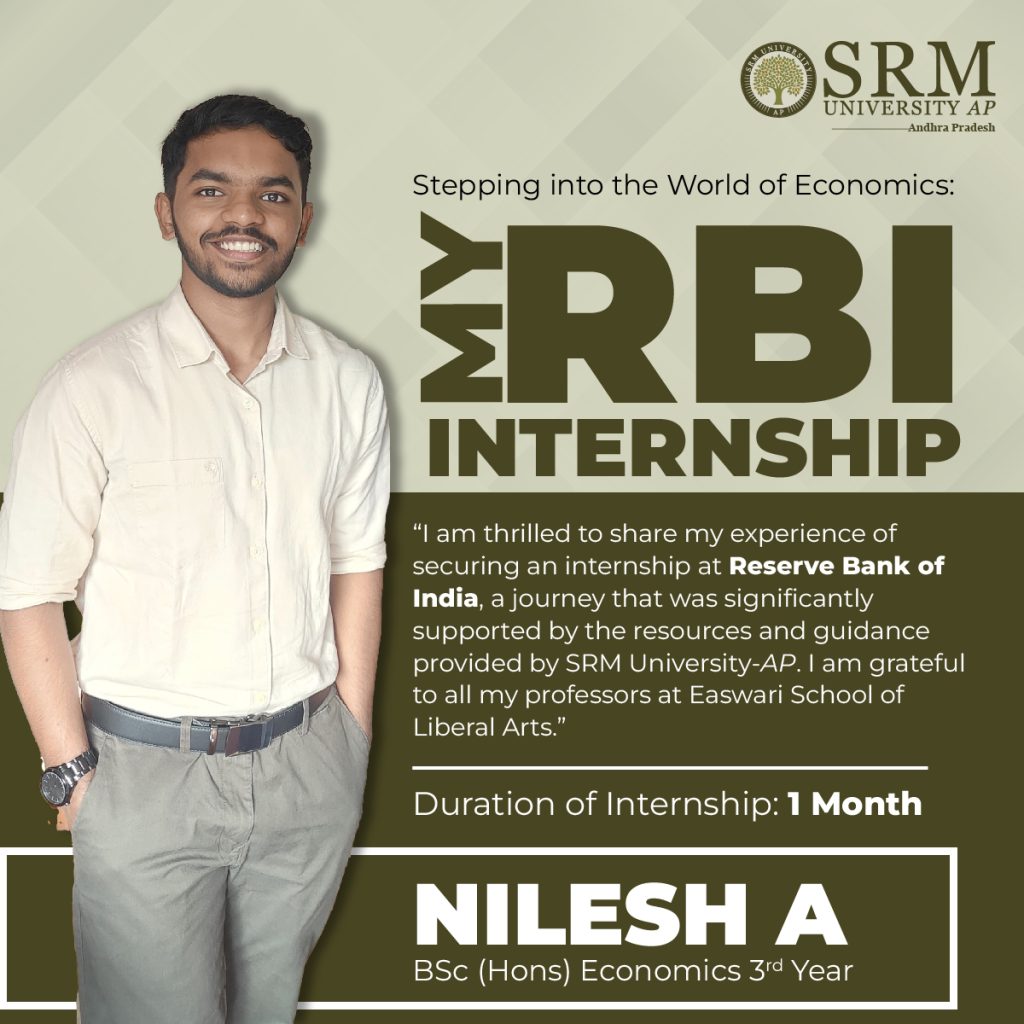
The Department of Economics proudly announces that Mr Nilesh A, a third-year B.Sc. Economics (Hons.) student, has secured a highly coveted one-month research-based internship at the Reserve Bank of India, Mumbai. This internship is under the Department of Economic and Policy Research (DEPR).
“I am thrilled to share my experience of securing an internship at the Reserve Bank of India, a journey that was significantly supported by the resources and guidance provided by my university. I am grateful to all my professors at Easwari School of Liberal Arts at SRM University-AP for their unwavering support and encouragement. This internship is a pivotal step in my career, and I am excited about the future and eager to continue building on this incredible foundation,” stated Nilesh while expressing his gratitude for this once-in-a-lifetime opportunity.
Internships are remarkable opportunities to gain experience and exposure, build a strong network, and hone the skills you already possess. The Easwari School of Liberal Arts of SRM University-AP provides academic and research internships prioritising experiential and industry-based learning to help students cultivate a refined practical skillset.
Continue reading →


